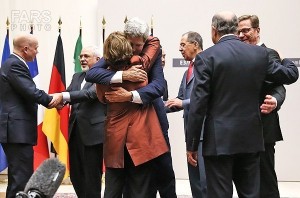 Nov 26 (Reuters) - Americans back a newly brokered nuclear deal with�Iran�by a 2-to-1 margin and are very wary of the United States resorting to military action against Tehran even if the historic diplomatic effort falls through, a Reuters/Ipsos poll showed on Tuesday.
Nov 26 (Reuters) - Americans back a newly brokered nuclear deal with�Iran�by a 2-to-1 margin and are very wary of the United States resorting to military action against Tehran even if the historic diplomatic effort falls through, a Reuters/Ipsos poll showed on Tuesday.The findings were rare good news in the polls for President�Barack Obama, whose approval ratings have dropped in recent weeks because of the botched rollout of his signature healthcare reform law.
According to the Reuters/Ipsos survey, 44 percent of Americans support the interim deal reached between�Iran�and six world powers in Geneva last weekend, and 22 percent oppose it.
While indicating little trust among Americans toward Iranian intentions, the survey also underscored a strong desire to avoid new U.S. military entanglements after long, costly wars in�Iraq�and�Afghanistan.
Even if the�Iran�deal fails, 49 percent want the United States to then increase sanctions and 31 percent think it should launch further diplomacy. But only 20 percent want U.S. military force to be used against Iran.
The survey's results suggest that a U.S. public weary of war could help bolster Obama's push to keep Congress from approving new sanctions that would complicate the next round of negotiations for a final agreement with Iran.
"This absolutely speaks to war fatigue, where the American appetite for intervention - anywhere - is extremely low," Ipsos pollster Julia Clark said. "It could provide some support with Congress for the arguments being made by the administration."
Tehran accepted temporary restrictions on its nuclear program in exchange for limited relief from tough economic sanctions under the Geneva deal, which the White House sees as a "first step" toward ensuring that Iran cannot develop an atomic bomb.
Obama and his aides are casting the Iran deal as the best alternative to a new Middle East conflict as they push back against skeptical lawmakers and close U.S. ally�Israel�who accuse Washington of giving up too much for too little.
A number of lawmakers, especially Republicans, have insisted they will try to enact stiffer new sanctions, which the Obama administration says would poison the negotiating atmosphere during the six months allotted to achieve a long-term accord.
But signs of significant public support for the Iran deal could give some of Obama's own pro-Israel Democrats, who may fear being branded as inadequately supportive of the Jewish state in the 2014 U.S. congressional elections, political cover to stick with the president.
SUPPORT FOR ISRAEL REMAINS HIGH
Reflecting deep suspicions over Iran's sincerity after more than three decades of estrangement between the two countries, the poll shows that 63 percent of Americans believe Tehran's nuclear program is intended to develop a bomb - although Iran says the project is only for civilian purposes.
Despite that, 65 percent of those polled agreed that the United States "should not become involved in any military action in the Middle East unless America is directly threatened." Only 21 percent disagreed with the statement.
There was every indication, however, that American public support for�Israel�remained high despite Prime Minister Benjamin Netanyahu's denunciation of the Iran deal as a "historic mistake" and new strains in U.S.-Israeli relations.
Fifty percent supported the notion that the United States "should use its military power to defend Israel against threats to its security, no matter where they come from." Thirty-one percent disagreed.
Even as the poll showed a moderately favorable response to Obama's attempt at rapprochement with Iran, the diplomatic breakthrough did not appear to have offered any immediate political boost at home to the embattled president. Foreign affairs rarely trump domestic matters in terms of presidential popularity.
"This might have an effect on some of the political dialogue," Clark said. "But I don't think it's a game-changer that's going to reverse the tide from the president's current pretty negative approval ratings."
A separate Reuters/Ipsos tracking poll on Tuesday showed Obama's approval rating languishing at 38 percent, with 56 percent disapproving of the way he is handling his job. He spent the past three days on a swing through Western states trying to recover lost ground over his flawed healthcare rollout.
The final outcome of Obama's Iran engagement strategy remains uncertain, but success would mean a big legacy-shaping achievement that might help to polish what is widely perceived to be a less than stellar foreign policy record.
But if the talks break down and Iran dashes to build an atomic bomb before the West can stop it, Obama could go into the history books as the president whose naivete allowed the Islamic Republic to go nuclear.
The precision of Reuters/Ipsos online polls is measured using a credibility interval. In this case, the poll - which was conducted from Sunday through Tuesday with 591 respondents - has a credibility interval of plus or minus 4.9 percentage points.
By Reuters
The Iran Project is not responsible for the content of quoted articles.










